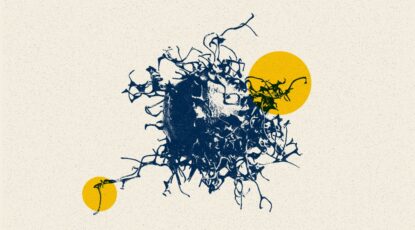Research News
-
U.S. families experience more chronic food insecurity now than 20 years ago
Researchers find the rate of families reporting chronic food insecurity between 2015-19 more than doubled compared to families surveyed in 1999 to 2003. Bad timing: SNAP and similar benefits may decrease as the federal Public Health Emergency for COVID-19 comes to an end.
-
Study shows promising treatment for tinnitus
Some 15% of adults in the U.S. have tinnitus, that ringing, buzzing, or hissing sound of silence. U-M researchers at the Kresge Hearing Research Institute suggest relief may be possible.
-
A promising new target for antibiotics
In an effort to prevent another global health crisis, scientists have discovered a promising target for new and improved antibiotics. Riboswitches are small stretches of RNA that regulate a process necessary for the production of proteins by the bacterial cell.
-
Research sheds light on low rates of genetic testing for cancer
Experts recommend germline genetic testing for patients diagnosed with cancer to enable targeted treatment and identify relatives who can benefit from personalized cancer screening and prevention. And yet very few people diagnosed with cancer actually do it.
-
U-M experts: We need to emphasize AI’s societal impacts over tech advances
Artificial intelligence is all over the news lately. And for good or ill, it has implications for us all. Faculty experts who’ve studied AI’s rise across business, society and the culture at large, say we need to be less in awe of the tech and more focused on the risks and benefits.
-
AI could run a million microbial experiments per year
An artificial intelligence system enables robots to conduct autonomous scientific experiments — as many as 10,000 per day — potentially driving a drastic leap forward in the pace of discovery in areas from medicine to agriculture to environmental science.
-
Evidence of conscious-like activity in the dying brain
Reports of near-death experiences — with tales of white light, visits from departed loved ones, hearing voices —capture our imagination and are deeply engrained in our cultural landscape. Now a new study reveals intriguing brain wave patterns in comatose patients.
-
Building curious machines — and finding shipwrecks
We know more about Mars than our own oceans and lakes. Artificial intelligence could change all that.– by combining robotics, naval architecture and computer science to build a software system that can trawl through sonar data much as a human would.
-
Advancing chips for the auto sector is the goal of new Michigan-based initiative
The STAR initiative is a public-private partnership that will focus on developing the talent base and infrastructure necessary to accelerate advanced semiconductor applications for electrification and autonomous mobility.










